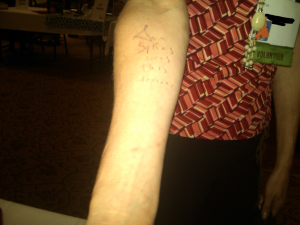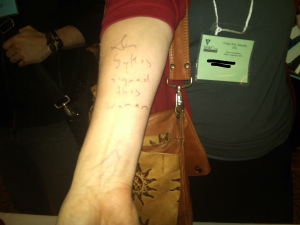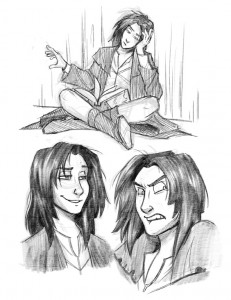Nerdraging is a pretty funny thing. I don’t usually do it over losing a game or something similar. Rather, it’s bad writing that gets me. And usually, I’m pretty good about steering clear of games with distinctively bad writing.
Usually…
And then I picked up Castlevania: Lords of Shadow.
Note: this isn’t a review of said game. You can find a pretty apt one at Gametrailers.
Rather, the reviews of this game are what brings about my beef with it. They praised the thunderous combat and warned me of the terrible platforming. They were dead-on: both of these are present in spades. What I feel a little betrayed by is the fact that many reviews talk about the writing as a selling point, as though the story of Gabriel’s quest to resurrect his dead wife is particularly well-wrought and worthy of praise.
With voices like Patrick Stewart behind the project, one could certainly expect that. And with Patrick Stewart, one can definitely count on the lines being well-delivered, but delivery and writing are two different things.
The writing of Lords of Shadow is pretty bad. I mean, the plot isn’t particularly out there or hard to follow: Gabriel is a dude from a religious order dedicated to connecting heaven and earth again and ending the reign of nightmare beasts plaguing humanity by killing the titular Lords, who are, indeed, shadowy. Getting his dead wife back is a bonus.
I don’t think simple plots are something to be avoided. A plot that’s difficult to follow is not necessarily deep and a plot that has a straightforward goal is not necessarily shallow. The problem is, Lords of Shadow certainly is shallow. The depth of a story comes from its writing elements, and this is where we can learn from it.
How To Make Magic Boring
Five Things I Hate About Lords of Shadow
1. Motives on Parade or “Hi, I’m Nancy. My parents were murdered in front of my eyes, I’m on a quest to kill the evil lord and I like long walks on the beach.”
Lords of Shadow has this hilarious tendency for characters to tell Gabriel everything about themselves within five minutes of meeting them. I gather the temptation to do this is so that the story can be moved along, or to reveal something cool about the character. The problem with this is twofold, though.
First of all, a character whose entire history and personality is learned within five minutes of meeting them is not an interesting character. Why? Because why bother going further? We know everything now: their hopes, their dreams, their aspirations. You can have a character’s motives evolve, and straightforward motives that react and mutate according to the conflict are wonderful to read, but that rarely seems to happen.
And two, it’s stupid. No one does that except people who should not be believed, which brings me to…
2. Lack of Ambiguity or “Liars?! In my plot?!”
Gabriel believes everything he hears. Gabriel believes everything people tell him. Gabriel is rarely surprised by anything he sees.
A strange girl who rides a giant golem and talks in his brain? Well, that’s just fine. A dude has just come out of nowhere claiming to be a renowned warrior? Who would lie about that? The dialogue between Gabriel and his companion Zobek, upon meeting each other, goes like this (paraphrased):
Zobek: Sup.
Gabriel: Sup. Who you?
Zobek: Zobek.
Gabriel: Oh, right.
Zobek: Hey, do you need to kill the lords of shadow and bring back your dead wife?
Gabriel: How’d you know that?
Zobek: Prophecy.
Gabriel: Oh…yeah. Hey, let’s team up.
Zobek: Word.
I talked about this a little in my discussion of Col Buchanan’s Farlander, but I cannot stand characters that are aware that they’re in a story. The idea of accepting everything that comes along makes me think the author just wanted to keep the story moving and couldn’t waste time on a little characterization or depth.
Beyond that, it completely diminishes the idea of a fantastic world if everything is explained all the time and everyone believes it. The Dark Lord isn’t scary if someone comes up and tells you his entire life story and the hero buys it. Magic isn’t magical if there’s nothing to weigh against it. Which segues nicely into…
3. Boring Magic or “Harry Potter’s Technical Manual”
The sense of wonder we get from a story is what we call worldbuilding. It’s not a thesis on the silk trade of a city nor an explanation of the alchemical processes in a mystic laxative; it’s the character of the setting itself. And we can only experience that character through the other characters. If everything is explained, detailed and discussed prior to the experience, the reader has no tension and has no incentive to keep going.
In Lords of Shadow, there is a place called Oblivion Lake that Gabriel must go to. Why? The elder god Pan explains it: “You seek to talk to the spirit world. The quickest way to reach it is to die. Go to Oblivion Lake, Gabriel, and you will find at least one way.”
…nah, I’m bullshitting you. I wrote that. The actual line of dialogue is: “Go to Oblivion Lake, where the dead can contact the living, and you will find your slain wife.”
…and that’s exactly what you do.
Wonder comes from tension. Tension comes from uncertainty. Unless…
4. Not Saying All the Wrong Things or “Here is an Ancient City. Climb over it to get to the plot.”
Lords of Shadows’ opening act takes place in a ruined city of magic and wonder that was destroyed when an epic battle raged between the invading Lycans with their troll and goblin lackeys and the mighty Titans of War created by the city’s mages to defend them.
Where did the Lycans come from? If the city was a product of magic and glory, where is the evidence of that? What is the significance of the blank-eyed statues of women everywhere? Why do the Lycans settle here instead of moving on? What is their connection to the trolls and the goblins that also infest the city?
All these questions and more…are never answered.
This may sound contrary to my complaint of everything being explained, but it isn’t. A world full of mystery is enticing, but if the mystery is never at least partly solved, then it’s just a big tease. We want to learn more about the world, we just don’t want it all laid out in front of us with no effort on our part. Becoming invested in a world predisposes an audience to becoming invested in the characters that inhabit and vice-versa. It’s a marvelous symbiosis that works extremely well and isn’t actually all that hard to pull off.
Exploration and explanation are two different things and Lords of Shadow has the emphasis on the latter.
And finally…
5. The Treadmill Effect or “When faced with a city of wonder, the ideal response is not ‘buh.'”
Gabriel is boring.
There’s no getting around that. There is nothing remotely interesting about him. Your investment in him as a player is only that he is the character you are controlling. He does not move the plot, the plot moves around him. This basically summarizes the Treadmill Effect: the character is merely running along a treadmill, doing nothing, as the world glides by him.
Now, by virtue of being the main character, he has to be accessible to the audience and one of the best ways to do this is to make him at least a little naive, confused or just plain dumb. This means that everything is new to him and we get to learn along with him. A jaded veteran isn’t an ideal character since he’s been around enough to see the stuff we’re seeing and already be bored with it. But the opposite, a character with too little experience, is also stupid because he accepts everything at a glance and there is no conflict between him and the world and both characters are stunted for it.
The Straight Man is not necessarily the Boring Man. A character can be the guy that the world bounces off of, but the dents should be noticeable. You cannot live in a world of blood and darkness and readily accept everything you see as truth. It’s just not interesting.
Now, to be totally fair, I’m barely a fourth of the way through Lords of Shadow. I intend to finish it (though maybe after I get Enslaved: Odyssey to the West), and if these things are altered, I’ll be happy to report where my disappointments were remedied.
But it’s not a good start.





